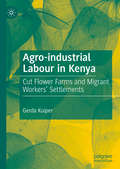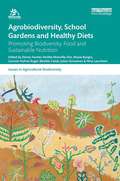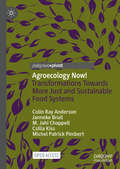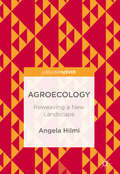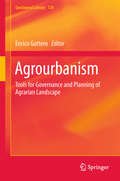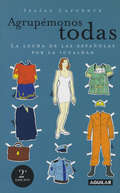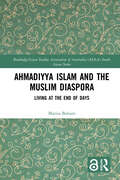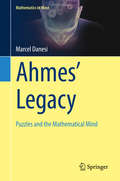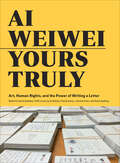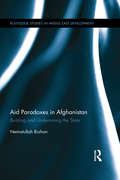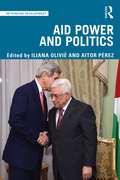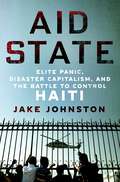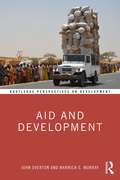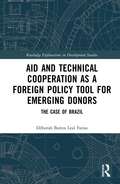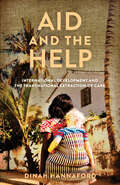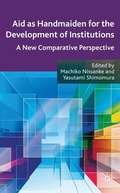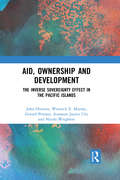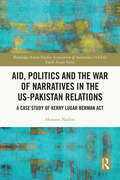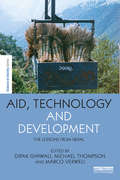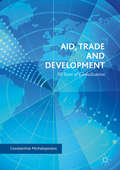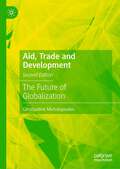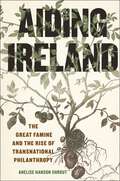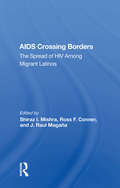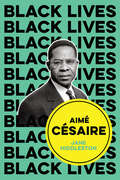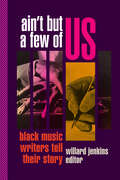- Table View
- List View
Agro-industrial Labour in Kenya: Cut Flower Farms and Migrant Workers’ Settlements
by Gerda KuiperThis ethnography analyses labour relations within the export-oriented cut flower industry at Lake Naivasha in Kenya. Though this agro-industry has attracted critical attention from journalists and non-governmental organizations, this book is the first comprehensive, social scientific analysis of the industry’s labour arrangements and production processes. Gerda Kuiper here interprets the work on the farms as ‘agro-industrial labour’: a labour system characterized by high levels of discipline and a strict rhythm of work, due to the demands posed by a highly perishable agricultural product. This framework enables the author to draw on insights from a wide range of anthropological and sociological studies on (agro-)industrial wage labour around the globe. This mixed-methods approach, deployed alongside rich ethnographic detail, allows the author to center the flower farm workers in her analysis.
Agrobiodiversity, School Gardens and Healthy Diets: Promoting Biodiversity, Food and Sustainable Nutrition (Issues in Agricultural Biodiversity)
by Danny HunterThis book critically assesses the role of agrobiodiversity in school gardens and its contribution to diversifying diets, promoting healthy eating habits and improving nutrition among schoolchildren as well as other benefits relating to climate change adaptation, ecoliteracy and greening school spaces. Many schoolchildren suffer from various forms of malnutrition and it is important to address their nutritional status given the effects it has on their health, cognition, and subsequently their educational achievement. Schools are recognized as excellent platforms for promoting lifelong healthy eating and improving long-term, sustainable nutrition security required for optimum educational outcomes. This book reveals the multiple benefits of school gardens for improving nutrition and education for children and their families. It examines issues such as school feeding, community food production, school gardening, nutritional education and the promotion of agrobiodiversity, and draws on international case studies, from both developed and developing nations, to provide a comprehensive global assessment. This book will be essential reading for those interested in promoting agrobiodiversity, sustainable nutrition and healthy eating habits in schools and public institutions more generally. It identifies recurring and emerging issues, establishes best practices, identifies key criteria for success and advises on strategies for scaling up and scaling out elements to improve the uptake of school gardens.
Agroecology Now!: Transformations Towards More Just and Sustainable Food Systems
by M. Jahi Chappell Colin Ray Anderson Janneke Bruil Csilla Kiss Michel Patrick PimbertThis open access book develops a framework for advancing agroecology transformations focusing on power, politics and governance. It explores the potential of agroecology as a sustainable and socially just alternative to today’s dominant food regime. Agroecology is an ecological approach to farming that addresses climate change and biodiversity loss while contributing to the Sustainable Development Goals. Agroecology transformations represent a challenge to the power of corporations in controlling food system and a rejection of the industrial food systems that are at the root of many social and ecological ills. In this book the authors analyse the conditions that enable and disable agroecology’s potential and present six ‘domains of transformation’ where it comes into conflict with the dominant food system. They argue that food sovereignty, community-self organization and a shift to bottom-up governance are critical for the transformation to a socially just and ecologically viable food system. This book will be a valuable resource to researchers, students, policy makers and professionals across multidisciplinary areas including in the fields of food politics, international development, sustainability and resilience.
Agroecology: Reweaving a New Landscape
by Angela HilmiThis book argues that sustainable development, based on sustained growth, has led us to an impasse. In response, Agroecology brings back and utilises notions of eco-development and co-evolution with nature as a refreshing paradigm. It also proposes a further shift in mindset with the notion of being within, or looking at agroecology as a way to reconnect and rebuild relationships and movement within farming systems and beyond. Rather than linear technical fixes, it considers the critical nodes of tension, the inflection points, or acupoints, which can trigger a transition towards greater harmony and well-being. The book also draws from a concrete example of agroecology by examining a pilot project in Mozambique testing new approaches to investments and peasant farming that will inspire farming communities, researchers, policy makers and development organizations alike, to build greater autonomy and self-determination.
Agrourbanism: Tools for Governance and Planning of Agrarian Landscape (GeoJournal Library #124)
by Enrico GotteroThis book provides a much needed overview of the agrourbanism topic in the context of territorial studies. It carefully looks at rural, urban, periurban farming in both professional and unprofessional capacities as one of the main sustainable forms of land use and management. This cutting edge text explores the various forms of agricultural and urban planning, as well as the main innovations that the agro-urban approach entails in terms of governance, spatial dimensions and functions. Agrourbanism provides a breadth of information and serves as a practical study of concerns facing policy and decision makers, planners and landscape managers, as well as farmers, managers of protected areas, local authorities and local action groups. As such this book is suitable as a course accompaniment to provide an overview of the complexity of agro-urban issues.
Agrupémonos todas: La lucha de las españolas por la igualdad
by Isaías LafuenteUna crónica de las pioneras en la lucha por la igualdad de la mujer en España. Hace poco más de un siglo un catedrático de la Universidad Central de Madrid espetó a María Elena Maseras, la primera universitaria española: «¡No quiero doctores con faldas!». Hace treinta años un miembro del tribunal que la examinaba exclamó ante la embajadora María Rosa Boceta: «¡Mientras yo esté en este tribunal no habrá en España una mujer diplomática!». Éstas y otras frases semejantes ponen en evidencia un pensamiento no solo arraigado socialmente sino protegido legalmente en nuestro país durante décadas: hubo que esperar hasta 1981 para que se alcanzara la plena igualdad jurídica entre hombres y mujeres. Es decir, antes de ayer. Sin embargo, durante ese tiempo muchas mujeres se levantaron contra la marginación. Fueron auténticas pioneras que no quisieron resignarse al futuro que les ofrecía una sociedad que las consideraba ciudadanas de segunda. Gracias a su empeño, pagado a veces con la cárcel o con la vida, desbrozaron el camino de la igualdad luchando casi siempre en soledad y ante la incomprensión de hombres y mujeres. Su historia es la que relata Isaías Lafuente en este libro.
Ahmadiyya Islam and the Muslim Diaspora: Living at the End of Days (Routledge / Asian Studies Association of Australia (ASAA) South Asian Series)
by Marzia BalzaniThis book is a study of the UK-based Ahmadiyya Muslim community in the context of the twentieth-century South Asian diaspora. Originating in late nineteenth-century Punjab, the Ahmadis are today a vibrant international religious movement; they are also a group that has been declared heretic by other Muslims and one that continues to face persecution in Pakistan, the country the Ahmadis made their home after the partition of India in 1947. Structured as a series of case studies, the book focuses on the ways in which the Ahmadis balance the demands of faith, community and modern life in the diaspora. Following an overview of the history and beliefs of the Ahmadis, the chapters examine in turn the use of ceremonial occasions to consolidate a diverse international community; the paradoxical survival of the enchantments of dreams and charisma within the structures of an institutional bureaucracy; asylum claims and the ways in which the plight of asylum seekers has been strategically deployed to position the Ahmadis on the UK political stage; and how the planning and building of mosques serves to establish a home within the diaspora. Based on fieldwork conducted over several years in a range of formal and informal contexts, this timely book will be of interest to an interdisciplinary audience from social and cultural anthropology, South Asian studies, the study of Islam and of Muslims in Europe, refugee, asylum and diaspora studies, as well as more generally religious studies and history.
Ahmes’ Legacy: Puzzles And The Mathematical Mind (Mathematics in Mind)
by Marcel DanesiThis book looks at classic puzzles from the perspective of their structures and what they tell us about the brain. It uses the work on the neuroscience of mathematics from Dehaene, Butterworth, Lakoff, Núñez, and many others as a lens to understand the ways in which puzzles reflect imaginative processes blended with rational ones. The book is not about recreational or puzzle-based mathematics in and of itself but rather about what the classic puzzles tell us about the mathematical imagination and its impact on the discipline. It delves into the history of classic math puzzles, deconstructing their raison d’être and describing their psychological features, so that their nature can be fleshed out in order to help understand the mathematical mind.This volume is the first monographic treatment of the psychological nature of puzzles in mathematics. With its user-friendly technical level of discussion, it is of interest to both general readers and those who engage in the disciplines of mathematics, psychology, neuroscience, and/or anthropology. It is also ideal as a textbook source for courses in recreational mathematics, or as reference material in introductory college math courses.
Ai Weiwei: Yours Truly
by Ai Weiwei Jasmine HeissA chronicle of the Chinese contemporary artist&’s interactive piece on prisoners of conscience, human rights, and the power of art and letter writing. Internationally renowned artist Ai Weiwei works at the intersection of art and politics. In 2014, he created @Large: Ai Weiwei on Alcatraz, an exhibition that engaged nearly 900,000 visitors in a conversation about human rights and freedom of expression. One of the artworks included was Yours Truly. This installation invited visitors to write postcards to prisoners of conscience around the world. On pre-addressed cards depicting the national birds and flowers of the countries where each prisoner was held, visitors wrote messages of hope, humor, and solidarity. In total, 92,829 postcards were written and sent. Ai Weiwei: Yours Truly delves into this astonishing project and invites you to engage with a work of art and a cause. Essays and a statement from the artists himself give a wider artistic and political context. In candid and heartfelt testimonials, five former prisoners and their loved ones—Ahmed Maher, Irom Sharmila Chanu, John Kiriakou, Chelsea Manning, and the family of Ebrahim Sharif Al Sayed—reflect on experiences of activism and detainment, and share the impact of receiving hundreds of postcards from people they would never meet. And photographs from the exhibition show the ordinary people who participated in the projects and some of the messages they wrote. This book is a visually stunning document, an inspiring call-to-arms, and a testament to the power of art to transform lives.
Aid Paradoxes in Afghanistan: Building and Undermining the State (Routledge Studies in Middle East Development)
by Nematullah BizhanThe relationship between aid and state building is highly complex and the effects of aid on weak states depend on donors’ interests, aid modalities and the recipient’s pre-existing institutional and socio-political conditions. This book argues that, in the case of Afghanistan, the country inherited conditions that were not favourable for effective state building. Although some of the problems that emerged in the post-2001 state building process were predictable, the types of interventions that occurred—including an aid architecture which largely bypassed the state, the subordination of state building to the war on terror, and the short horizon policy choices of donors and the Afghan government—reduced the effectiveness of the aid and undermined effective state building. By examining how foreign aid affected state building in Afghanistan since the US militarily intervened in Afghanistan in late 2001 until the end of President Hamid Karzai’s first term in 2009, this book reveals the dynamic and complex relations between the Afghan government and foreign donors in their efforts to rebuild state institutions. The work explores three key areas: how donors supported government reforms to improve the taxation system, how government reorganized the state’s fiscal management system, and how aid dependency and aid distribution outside the government budget affected interactions between state and society. Given that external revenue in the form of tribute, subsidies and aid has shaped the characteristics of the state in Afghanistan since the mid-eighteenth century, this book situates state building in a historical context. This book will be invaluable for practitioners and anyone studying political economy, state building, international development and the politics of foreign aid.
Aid Power and Politics (Rethinking Development)
by Iliana Olivié Aitor PérezAid Power and Politics delves into the political roots of aid policy, demonstrating how and why governments across the world use aid for global influence, and exploring the role it plays in present-day global governance and international relations. In reconsidering aid as part of international relations, the book argues that the interplay between domestic and international development policy works in both directions, with individual countries having the capacity to shape global issues, whilst at the same time, global agreements and trends, in turn, shape the political behaviour of individual countries. Starting with the background of aid policy and international relations, the book goes on to explore the behaviour of both traditional and emerging donors (the US, the UK, the Nordic countries, Japan, Spain, Hungary, Brazil, and the European Union), and then finally looks at some big international agendas which have influenced donors, from the liberal consensus on democracy and good governance, to gender equality and global health. Aid Power and Politics will be an important read for international development students, researchers, practitioners and policy makers, and for anyone who has ever wondered why it is that countries spend so much money on the well-being of non-citizens outside their borders.
Aid State: Elite Panic, Disaster Capitalism, and the Battle to Control Haiti
by Jake JohnstonHaiti’s state is near-collapse: armed groups have overrun the country, many government officials have fled after the 2021 assassination of President Moise and not a single elected leader holds office, refugees desperately set out on boats to reach the US and Latin America, and the economy reels from the after-effects of disasters, both man-made and natural, that destroyed much of Haiti’s infrastructure and institutions. How did a nation founded on liberation—a people that successfully revolted against their colonizers and enslavers—come to such a precipice?In Aid State, Jake Johnston, a researcher and writer at the Center for Economic and Policy Research in Washington, DC, reveals how long-standing US and European capitalist goals ensnared and re-enslaved Haiti under the guise of helping it. To the global West, Haiti has always been a place where labor is cheap, politicians are compliant, and profits are to be made. Over the course of nearly 100 years, the US has sought to control Haiti and its people with occupying police, military, and euphemistically-called peacekeeping forces, as well as hand-picked leaders meant to quell uprisings and protect corporate interests. Earthquakes and hurricanes only further devastated a state already decimated by the aid industrial complex. Based on years of on-the-ground reporting in Haiti and interviews with politicians in the US and Haiti, independent aid contractors, UN officials, and Haitians who struggle for their lives, homes, and families, Aid State is a conscience-searing book of witness.
Aid and Development: The Inverse Sovereignty Effect In The Pacific Islands (Routledge Perspectives on Development)
by Warwick E. Murray John OvertonThis book provides an overview of what aid is, how it has changed over time and how it is practiced, as well as debates about whether aid works, for whom and what its future might be. The text shows how ‘aid’ is a contested and fluid concept that involves a wide and changing variety of policies, actors and impacts. It equips the reader with an understanding of what aid is, where it comes from and where it goes, how it is delivered and what its impacts are, and whether shortcomings are a result of a fundamental problem with aid, or merely the result of bad practices. It explores the changing political ideologies and conceptions of development that continually reshape how aid is defined, implemented and assessed, and how, despite a global commitment to the Sustainable Development Goals, we are at a point where the very notion of aid is being questioned and its future is uncertain. Each chapter includes case studies, chapter summaries, discussions, weblinks and further reading, to help strengthen the reader’s understanding. Aid and Development provides an important resource for students, development workers and policy makers seeking an understanding of how aid works.
Aid and Technical Cooperation as a Foreign Policy Tool for Emerging Donors: The Case of Brazil (Routledge Explorations in Development Studies)
by Déborah Barros FariasThe question of why countries give aid and assistance to other countries has long been a topic of debate- is it altruism, or selfishness? The assumption is sometimes made that donors from developing countries might be more motivated by altruism than ‘traditional’ western donors. This book demonstrates that on the contrary, the provision of development assistance can be used to serve national interests, allowing so-called ‘emerging’ donors to gain soft power in the international sphere by improving their image and global influence. Technical cooperation, or the transfer of knowledge, is an area of particular interest, as it can enable donors to position themselves as a global leader in a given field, with a unique set of skills and expertise in a knowledge area. This book uses the Brazilian case to demonstrate how a country such as Brazil can seek power and influence by providing no-strings-attached technical assistance. The empirical analysis unpicks the motivations behind development assistance, and how it can be used as a foreign policy tool. In doing so, the book sheds light upon the similarities and variations in the provision of technical cooperation as a foreign policy tool by China, India, and Brazil. This book will be of interest to researchers of International Development, South-South Cooperation, International Relations, and those working on Brazil specifically.
Aid and the Help: International Development and the Transnational Extraction of Care (Globalization in Everyday Life)
by Dinah HannafordHiring domestic workers is a routine part of the expat development lifestyle. Whether working for the United Nations, governmental aid agencies, or NGOs such as Oxfam, Save the Children, or World Vision, expatriate aid workers in the developing world employ maids, nannies, security guards, gardeners and chauffeurs. Though nearly every expat aid worker in the developing world has local people working within the intimate sphere of their homes, these relationships are seldom, if ever, discussed in analyses of the development paradigm and its praxis. Aid and the Help addresses this major lacuna through an ethnographic analysis of the intersection of development work and domestic work. Examining the reproductive labor cheaply purchased by aid workers posted overseas opens the opportunity to assess the multiple ways that the ostensibly "giving" industry of development can be an extractive industry as well.
Aid as Handmaiden for the Development of Institutions
by Machiko Nissanke Yasutami ShimomuraThrough comparative studies of aid-supported infrastructure projects in East Asia and Sub-Saharan Africa, the book examines how aid could assist development processes by facilitating development of local endogenous institutions.
Aid, Ownership and Development: The Inverse Sovereignty Effect in the Pacific Islands
by Warwick E. Murray John Overton Gerard Prinsen Tagaloa Avataeao Ulu Nicola WrightonOne of the key principles for effective aid programmes is that recipient agencies exert high degrees of ownership over the agendas, resources, systems and outcomes of aid activities. Sovereign recipient states should lead the process of development. Yet despite this well-recognised principle, the realities of aid delivery mean that ownership is often compromised in practice. Aid, Ownership and Development examines this ‘inverse sovereignty’ hypothesis with regard to the states and territories of the Pacific Island region. It provides an initial overview of different aid ‘regimes’ over time, maps aid flows in the region, and analyses the concept of sovereignty. Drawing on a rich range of primary research by the authors and contributors, it focuses on the agencies and individuals within the Pacific Islands who administer and apply aid projects and programmes. There is indeed evidence for the inverse sovereignty effect; particularly when island states and their small and stretched bureaucracies have to deal with complex and burdensome donor reporting requirements, management systems, consultative meetings and differing strategic priorities. This book outlines important ways in which Pacific agencies have proved adept not only at meeting these requirements, but also asserting their own priorities and ways of operating. It concludes that global agreements, such as the Paris Declaration on Aid Effectiveness in 2005 and the recently launched Sustainable Development Goals, can be effective means for Pacific agencies to both hold donors to account and also to recognise and exercise their own sovereignty.
Aid, Politics and the War of Narratives in the US-Pakistan Relations: A Case Study of Kerry Lugar Berman Act (Routledge / Asian Studies Association of Australia (ASAA) South Asian Series)
by Hussain NadimThis book analyses the aid, politics and the war of narratives between the US and Pakistan under the Kerry Lugar Berman Act (2009–2013), using the security-development nexus as a framing discourse and taking a decolonial approach to the subject. The book explores the politics of US foreign aid to Pakistan, with regard to the issues of ‘sovereignty’ and ‘agency’, to analyse the notions of aid, power and narratives in the asymmetrical US-Pakistan relations. Based on primary interviews and extensive data analysis of US foreign aid datasets, the book specifically argues that foreign aid is based under the hubris of the security-development nexus, which encourages a dialectical power struggle between the US and Pakistan, and between the civil and military actors inside Pakistan, which use the indivisibility of security and development to advance their strategic interests over each other. This book is a timely analysis given the recent political turmoil in Pakistan that saw the ouster of Prime Minister Imran Khan who blamed the Biden Administration for orchestrating a “regime change” conspiracy against his government. Interdisciplinary and relevant to academic and policy debates, this book will be of interest to researchers in the fields of Development Studies, International Relations, Policy Studies, Area Studies and, in particular, South Asian Politics.
Aid, Technology and Development: The Lessons from Nepal (The Earthscan Science in Society Series)
by Dipak Gyawali, Michael Thompson and Marco VerweijOver the last 50 years, Nepal has been considered an experiential model in determining the effectiveness and success of global human development strategies, both in theory and in practice. As such, it provides a rich array of in-depth case studies in both development success and failure. This edited collection examines these in order to propose a novel perspective on how human development occurs and how it can be aided and sustained. Aid, Technology and Development: The lessons from Nepal champions plural rationality from both a theoretical and practical perspective in order to challenge and critique the status quo in human development understanding, while simultaneously presenting a concrete framework with which to aid citizen and governmental organisations in the galvanization of human development. Including contributions by leading international social scientists and development practitioners throughout Nepal, this book will be of great interest to students, scholars and practitioners working in the field of foreign aid and development studies.
Aid, Trade and Development: 50 Years of Globalization
by Constantine MichalopoulosThis enlightening book offers a comprehensive historical analysis of the main development challenges of the last half century and the international community's response through aid and trade. Much has happened: the oil crises of the 1970s, the debt crises of the 1980s, the break-up of the Soviet Union in the 1990s, the Millennium Development Goals, the onslaught of Globalization and the rise of its opponents since the financial crisis of the 2000s. Through it all, development has spread and global poverty declined. The volume assesses the contributions and coherence of developing and developed country policies and the role played by global institutions entrusted with responsibilities to enhance trade and support development. The volume concludes with a focus on the prospects for the future and the changes needed to make globalization more equitable. With 50 years of professional experience in the World Bank, the WTO and bilateral aid agencies, Michalopoulos brings an insider's perspective on the workings of these institutions and what needs to be done to make them more effective and responsive to changing global needs.
Aid, Trade and Development: The Future of Globalization
by Constantine MichalopoulosThis volume presents a broad sweep of modern economic history underpinning aid, trade, development and globalization in the last half century and the salient challenges facing the global community today. The author draws on his long years as an academic and development practitioner to recommend what needs to be done to cope with the backsliding of the fight against global poverty, fractured geopolitics and the threats to the multilateral economic order. The new, revised edition analyses how unilateralism, rising protectionism and the Covid-19 pandemic seriously threaten global sustainable development. It concludes with recommendations on the policy changes needed to make globalization more equitable and development more sustainable. This book will be of interest to researchers and students of economic development and economic history, as well as all those concerned about global inequality and sustainability.
Aiding Ireland: The Great Famine and the Rise of Transnational Philanthropy (The Glucksman Irish Diaspora Series)
by Anelise Hanson ShroutLooks at the ways that disparate groups used Irish famine relief in the 1840s to advance their own political agendasFamine brought ruin to the Irish countryside in the nineteenth century. In response, people around the world and from myriad social, ethnic, and religious backgrounds became involved in Irish famine relief. They included enslaved Black people in Virginia, poor tenant farmers in rural New York, and members of the Cherokee and Choctaw nations, as well as plantation owners in the US south, abolitionists in Pennsylvania, and, politicians in England and Ireland. Most of these people had no personal connection to Ireland. For many, the famine was their first time participating in distant philanthropy.Aiding Ireland investigates the Irish famine as a foundational moment for normalizing international giving. Anelise Hanson Shrout argues that these diverse men and women found famine relief to be politically useful. Shrout takes readers from Ireland to Britain, across the Atlantic to the United States, and across the Mississippi to Indian Territory, uncovering what was to be gained for each group by participating in global famine relief. Aiding Ireland demonstrates that international philanthropy and aid are never simple, and are always intertwined with politics both at home and abroad.
Aids Crossing Borders: The Spread Of Hiv Among Migrant Latinos
by Ross F. Conner Shiraz I. Mishra J. Raul MagañaAIDS has crossed every international border and affects all populationsthroughout the world, including migrant workers. In the U.S.,migrant workers are a hidden and sometimes maligned population withlimited access to needed health and welfare services, including HIVprevention. Little, however, is krown about the impact of the HIV IAIDS epidemic oo Latino farmworkers. This absence of systematic researchwas the impetus for the preparation of this book.This book is the first collection of research studies focusing specificallym migrant Latino farmworkers. The book brings together sevenresearch studies to provide a profile of the HN prevention, surveillanceand treatment needs of migrant workers. The editors combinetheir own work with that of nationally and internationally recognizedexperts to provide a comprehensive analysis of different aspects of theHIV epidemic among migrant Latino workers. They examine issuessuch as the HN prevention needs of Latino farmworking women andtheir children, the sexual beliefs and behaviors of Latino migrantworkers, the effects of migration m changes in sexuality and sexualpractices, the risk for HN through use of sex workers, knowledge aboutthe HIV I AIDS epidemic, the effectiveness of prevention programs, andpolicies and programs that may stem the spread of HIV among thispopulation. The book is notable for including, in addition to researchers'views, the perspectives of migrant workers and policymakers mHN prevention policies and programs.
Aimé Césaire: Inventor of Souls (Black Lives)
by Jane HiddlestonAimé Césaire is arguably the greatest Caribbean literary writer in history. Best known for his incendiary epic poem Notebook of a Return to My Native Land, Césaire reinvented black culture by conceiving ‘négritude’ as a dynamic and continuous process of self-creation. In this essential new account of his life and work, Jane Hiddleston introduces readers to Césaire’s unique poetic voice and to his role as a figurehead for intellectuals pursuing freedom and equality for black people. Césaire was deeply immersed in the political life of his native Martinique for over fifty years: as Mayor of Fort-de-France and Deputy at the French National Assembly, he called for the liberation of oppressed people at home and abroad, while celebrating black creativity and self-invention to resist a history of racism. Césaire’s extraordinary life reminds us that the much-needed revolt against oppression and subjugation can—and should—come from within the establishment, as well as without.
Ain't But a Few of Us: Black Music Writers Tell Their Story
by Willard JenkinsDespite the fact that most of jazz’s major innovators and performers have been African American, the overwhelming majority of jazz journalists, critics, and authors have been and continue to be white men. No major mainstream jazz publication has ever had a black editor or publisher. Ain’t But a Few of Us presents over two dozen candid dialogues with black jazz critics and journalists ranging from Greg Tate, Farah Jasmine Griffin, and Robin D. G. Kelley to Tammy Kernodle, Ron Welburn, and John Murph. They discuss the obstacles to access for black jazz journalists, outline how they contend with the world of jazz writing dominated by white men, and point out that these racial disparities are not confined to jazz but hamper their efforts at writing about other music genres as well. Ain’t But a Few of Us also includes an anthology section, which reprints classic essays and articles from black writers and musicians such as LeRoi Jones, Archie Shepp, A. B. Spellman, and Herbie Nichols.ContributorsEric Arnold, Bridget Arnwine, Angelika Beener, Playthell Benjamin, Herb Boyd, Bill Brower, Jo Ann Cheatham, Karen Chilton, Janine Coveney, Marc Crawford, Stanley Crouch, Anthony Dean-Harris, Jordannah Elizabeth, Lofton Emenari III, Bill Francis, Barbara Gardner, Farah Jasmine Griffin, Jim Harrison, Eugene Holley Jr., Haybert Houston, Robin James, Willard Jenkins, Martin Johnson, LeRoi Jones, Robin D. G. Kelley, Tammy Kernodle, Steve Monroe, Rahsaan Clark Morris, John Murph, Herbie Nichols, Don Palmer, Bill Quinn, Guthrie P. Ramsey Jr., Ron Scott, Gene Seymour, Archie Shepp, Wayne Shorter, A. B. Spellman, Rex Stewart, Greg Tate, Billy Taylor, Greg Thomas, Robin Washington, Ron Welburn, Hollie West, K. Leander Williams, Ron Wynn
